40.1.2.3.5 (40 > 49)
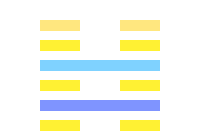
40.1.2.3.5 (40 > 49) - THE KIEH HEXAGRAM.
- 1. The first line, divided, shows that its subject will commit no error.
- 2. The second line, undivided, shows its subject catch, in hunting, three foxes, and obtain the yellow ( = golden) arrows. With firm correctness there will be good fortune.
- 3. The third line, divided, shows a porter with his burden, (yet) riding in a carriage. He will (only) tempt robbers to attack him. However firm and correct he may (try to) be, there will be cause for regret.
- 5. The fifth line, divided, shows (its subject), the superior man ( = the ruler), executing his function of removing (whatever is injurious to the idea of the hexagram), in which case there will be good fortune, and confidence in him will be shown even by the small men.
40.1.2.3.5 (40 > 49) - Demoralizing one's audience
One knows the solution but the others do not want to hear it.
Bing DeepL Google Yandex40.1.2.3.5 (40 > 49) - Demoralizing one's audience
One knows the solution but the others do not want to hear it.
Bing DeepL Google Yandex40.1.2.3.5 (40 > 49) - Kieh, la libération
Kieh : 1. Délivrer, faire échapper, échapper au danger ; 2. Disperser ; 3. Ouvrir, séparer, s’ouvrir. Se dit du mouvement de la germination. 4. Résoudre une difficulté, une complication.
-
1. Délivrer quelqu’un est chose excellente.
Quand le fort et le faible s’entendent selon la justice, il n’y a pas de faute à craindre. - 2. Délivrer est aussi heureux que, pour le chasseur, prendre trois renards et obtenir le prix, la flèche d’or. — Celui qui résout une difficulté, fait sortir d’une position difficile, est comme le chasseur qui prend trois renards et obtient la flèche d’or.
-
3. Si un porteur se met dans un char et qu’il survienne des voleurs, il sera attaqué et échappera difficilement ; s’il abandonne sa charge, il pourra se sauver.
Pour un porteur, aller en char est honteux ; c’est attirer sur soi les voleurs.
Il n’appartient pas à des gens du commun d’aller en char . - 5. C’est au sage d’écarter (les maux) et de résoudre (les difficultés) ; s’il y réussit, il gagnera la confiance du vulgaire.
40.1.2.3.5 (40 > 49) - Démoraliser son auditoire
On connaît la solution mais les autres ne veulent pas l'entendre.
Bing DeepL Google Yandex40.1.2.3.5 (40 > 49) - Módosítás
- 1. Fel akarja szabadítani magát, ez egy jó döntés.
- 2. Megkérik hogy válaszokat keressen mielőtt túl késő.
- 3. Ha valaki elhanyagolja, másoknak adja.
- 5. Csak egy alkalmas személy tudja megmutatni a megoldást.
The trigrams
The trigrams are combinations of three yin and yang lines. The three bottom lines of the hexagram form the lower trigram and represent the inner situation. The three top lines form the upper trigram and represent the outer situation.
Upper trigram: The thunder The lake


Lower trigram: The water The fire


The formation: 40
What is already there
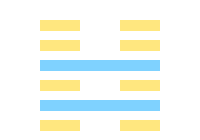
40 - THE KIEH HEXAGRAM.
In (the state indicated by) Kieh advantage will be found in the south-west. If no (further) operations be called for, there will be good fortune in coming back(to the old conditions). If some operations be called for, there will be good fortune in the early conducting of them.
Bing DeepL Google Yandex40 - Kieh, la libération
Kieh : 1. Délivrer, faire échapper, échapper au danger ; 2. Disperser ; 3. Ouvrir, séparer, s’ouvrir. Se dit du mouvement de la germination. 4. Résoudre une difficulté, une complication.
Texte et commentaire
Si l’on réussit à faire échapper aux dangers, on gagnera les gens à soi et l’on aura des relations heureuses ; on gardera le milieu. En tout ce que l’on fait, l’activité est chose utile et fait acquérir des mérites. Kieh est : se trouvant en danger, savoir agir et échapper. Quand le ciel et la terre ouvrent les pores (3e sens) des êtres, le tonnerre et la pluie se produisent. Alors les plantes et les arbres à fruit bourgeonnent. Bien important est le temps où tout s’ouvre.
Symbolisme
Le tonnerre et la pluie forment le Koua Kieh. Le sage est indulgent pour l’erreur et traite les coupables avec douceur.
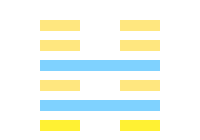
40.1 (40 > 54) - THE KIEH HEXAGRAM.
The first line, divided, shows that its subject will commit no error.
Bing DeepL Google Yandex40.1 (40 > 54) - Wanting to lose one's constraints
One wants to free oneself, it is a good decision.
Bing DeepL Google Yandex40.1 (40 > 54) - Wanting to lose one's constraints
One wants to free oneself, it is a good decision.
Bing DeepL Google Yandex40.1 (40 > 54) - Kieh, la libération
Kieh : 1. Délivrer, faire échapper, échapper au danger ; 2. Disperser ; 3. Ouvrir, séparer, s’ouvrir. Se dit du mouvement de la germination. 4. Résoudre une difficulté, une complication.
Délivrer quelqu’un est chose excellente.
Quand le fort et le faible s’entendent selon la justice, il n’y a pas de faute à craindre.
40.1 (40 > 54) - Vouloir perdre ses contraintes
On veut se libérer, c'est une bonne décision.
Bing DeepL Google Yandex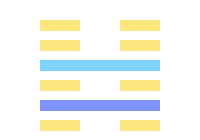
40.2 (40 > 16) - THE KIEH HEXAGRAM.
The second line, undivided, shows its subject catch, in hunting, three foxes, and obtain the yellow ( = golden) arrows. With firm correctness there will be good fortune.
Bing DeepL Google Yandex40.2 (40 > 16) - Defending one's rights
One is asked to find the answers before it is too late.
Bing DeepL Google Yandex40.2 (40 > 16) - Defending one's rights
One is asked to find the answers before it is too late.
Bing DeepL Google Yandex40.2 (40 > 16) - Kieh, la libération
Kieh : 1. Délivrer, faire échapper, échapper au danger ; 2. Disperser ; 3. Ouvrir, séparer, s’ouvrir. Se dit du mouvement de la germination. 4. Résoudre une difficulté, une complication.
Délivrer est aussi heureux que, pour le chasseur, prendre trois renards et obtenir le prix, la flèche d’or. — Celui qui résout une difficulté, fait sortir d’une position difficile, est comme le chasseur qui prend trois renards et obtient la flèche d’or.
Bing DeepL Google Yandex40.2 (40 > 16) - Défendre ses droits
On nous demande de trouver les réponses avant qu'il ne soit trop tard.
Bing DeepL Google Yandex40.2 (40 > 16) - Módosítás
Megkérik hogy válaszokat keressen mielőtt túl késő.
Bing DeepL Google Yandex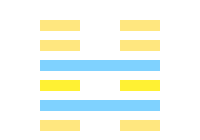
40.3 (40 > 32) - THE KIEH HEXAGRAM.
The third line, divided, shows a porter with his burden, (yet) riding in a carriage. He will (only) tempt robbers to attack him. However firm and correct he may (try to) be, there will be cause for regret.
Bing DeepL Google Yandex40.3 (40 > 32) - Forgiving slight mistakes
When one neglects, one gives to others.
Bing DeepL Google Yandex40.3 (40 > 32) - Forgiving slight mistakes
When one neglects, one gives to others.
Bing DeepL Google Yandex40.3 (40 > 32) - Kieh, la libération
Kieh : 1. Délivrer, faire échapper, échapper au danger ; 2. Disperser ; 3. Ouvrir, séparer, s’ouvrir. Se dit du mouvement de la germination. 4. Résoudre une difficulté, une complication.
Si un porteur se met dans un char et qu’il survienne des voleurs, il sera attaqué et échappera difficilement ; s’il abandonne sa charge, il pourra se sauver.
Pour un porteur, aller en char est honteux ; c’est attirer sur soi les voleurs.
Il n’appartient pas à des gens du commun d’aller en char .
40.3 (40 > 32) - Pardonner les fautes légères
Quand on néglige on donne aux autres.
Bing DeepL Google Yandex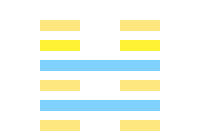
40.5 (40 > 47) - THE KIEH HEXAGRAM.
The fifth line, divided, shows (its subject), the superior man ( = the ruler), executing his function of removing (whatever is injurious to the idea of the hexagram), in which case there will be good fortune, and confidence in him will be shown even by the small men.
Bing DeepL Google Yandex40.5 (40 > 47) - Achieving one's goals
Only a capable person can show the solution.
Bing DeepL Google Yandex40.5 (40 > 47) - Achieving one's goals
Only a capable person can show the solution.
Bing DeepL Google Yandex40.5 (40 > 47) - Kieh, la libération
Kieh : 1. Délivrer, faire échapper, échapper au danger ; 2. Disperser ; 3. Ouvrir, séparer, s’ouvrir. Se dit du mouvement de la germination. 4. Résoudre une difficulté, une complication.
C’est au sage d’écarter (les maux) et de résoudre (les difficultés) ; s’il y réussit, il gagnera la confiance du vulgaire.
Bing DeepL Google Yandex40.5 (40 > 47) - Arriver à ses fins
Seule une personne compétente peut montrer la solution.
Bing DeepL Google Yandex40.5 (40 > 47) - Módosítás
Csak egy alkalmas személy tudja megmutatni a megoldást.
Bing DeepL Google YandexIn the making: 49
What is poised to happen

49 - THE KO HEXAGRAM.
(What takes place as indicated by) Ko is believed in only after it has been accomplished. There will be great progress and success. Advantage will come from being firm and correct. (In that case) occasion for repentance will disappear.
Bing DeepL Google Yandex49 - Tidying up
Renewal is necessary when shortcomings are identified and a replacement plan is in place. One will then have an interest in making the changes. Forget about regrets.
Bing DeepL Google Yandex49 - Tidying up
Renewal is necessary when shortcomings are identified and a replacement plan is in place. One will then have an interest in making the changes. Forget about regrets.
Bing DeepL Google Yandex49 - Koh, la révolution, la mue
Koh : 1. Peau, cuir, tanner, écorcher ; 2. Changer, différer.
Ko « changement, amélioration ». Quand, après avoir parlé, on se montre digne de confiance, tout suit un heureux cours, et le repentir disparaît (n’a plus de raison d’être).
Texte
Quand (on change) et qu’on devient sincèrement droit, on sera après cela constamment sans regret.
Symbolisme
L’eau sous le feu figure le changement. L’homme supérieur règle ses calculs (le calendrier) d’après les changements du ciel et annonce les temps et les saisons. — Dans les marais même il y a du feu.
Commentaire
L’eau et le feu, arrêtant mutuellement leur action, figurent koh. Il en est de même de deux soeurs habitant ensemble et de volontés différentes, opposées.
Après un certain temps, se montrer sincère, c’est changer, se corriger ; on inspire alors confiance. Par le talent et l’intelligence, on acquiert la satisfaction ; par de grands progrès en vertu, on acquiert la rectitude. Quand on change de cette manière, tous les sujets de regret disparaissent.
Le ciel et la terre changeant, les quatre saisons s’accomplissent. Tang et Wuh-Wang changèrent le décret céleste. Ainsi, ils obéirent au ciel et répondirent au désir des hommes. Grand, en effet, et bien important est le moment des changements.
Note. Tang est le chef de la dynastie Shang, qui enleva le trône au dernier des Hia (Ire dynastie), devenu tyran. Wuh-Wang renversa de même le dernier des Shang et lui enleva le décret céleste qui l’avait fait roi.
Note. Le § 1 prend le mot koh dans le sens de cuir ; les autres dans l’acception de changement, changement de conduite, correction ; changement d’ordres, de dispositions chez le sage et le grand ; changement des saisons, le plus important de tous, dit un commentaire
49 - Ranger
Le renouvellement est nécessaire quand on constate des insuffisances et que l'on a un plan de remplacement. On aura alors intérêt à mener les changements à bien. Oublier les regrets.
Bing DeepL Google Yandex49 - Vándor
Megújulásra van szükség ha hiányosságok tapasztalhatók és tartalék tervre. Az lesz az érdekük, hogy befejezzék a változást. El kell felejteni a megbánást.
Bing DeepL Google YandexThe nuclear hexagram: 63.1.2.4.6 (63 > 44)
The nuclear hexagram is the association of the two inner trigrams (lines 2,3,4 and 3,4,5). It represents the root, or the origin of the situation.
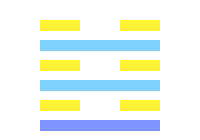
63.1.2.4.6 (63 > 44) - THE KÎ 3Î HEXAGRAM.
- 1. The first line, undivided, (shows its subject as a driver) who drags back his wheel, (or as a fox) which has wet his tail. There will be no error.
- 2. The second line, divided, (shows its subject as) a wife who has lost her (carriage-)screen. There is no occasion to go in pursuit of it. In seven days she will find it.
- 4. The fourth line, divided, shows its subject with rags provided against any leak (in his boat), and on his guard all day long.
- 6. The topmost line, divided, shows its subject with (even) his head immersed. The position is perilous.
63.1.2.4.6 (63 > 44) - Maximum
One is amazed by the finery of the courtiers.
Bing DeepL Google Yandex63.1.2.4.6 (63 > 44) - Maximum
One is amazed by the finery of the courtiers.
Bing DeepL Google Yandex63.1.2.4.6 (63 > 44) - Tchi tzi, ce qui suit l’achèvement
Tchi-tzi : traversée achevée, achèvement, succès, moyen d’achever, compléter.
- 1. Traversée achevée comme celle de quelqu’un qui, ayant fini son voyage, reprend les roues de son char, ou d’un renard qui, tout en traversant une rivière, a mouillé sa queue complètement.
-
2. Voyage fini (interrompu), comme d’une femme qui, ayant perdu le voile de son char (Keū tchi pi, tenture qui entourait le char et cachait la personne qui le montait. Sans ce voile, une femme vertueuse ne pouvait voyager. Son voyage était donc fini jusqu’à ce qu’elle le retrouve et elle ne pouvait aller à découvert pour le chercher) ne peut le chercher, mais le retrouve seulement après quelques (sept) jours.
Elle agit ainsi parce qu’elle suit la voie de la sagesse. -
4. Lorsque les bords, les franges d’un habit se mouillent, il faut être sur ses gardes jusqu’au bout de la traversée (ou bien : lorsqu’en bateau on est obligé d’employer les bords de ses habits pour boucher les trous, etc.).
Il y a lieu de craindre alors. -
6. Celui qui, en traversant (un fleuve), se mouille la tête, est en danger. (Si la tête même entre dans l’eau.)
Cette situation est dangereuse, on ne peut en prévoir l’issue.
63.1.2.4.6 (63 > 44) - Le maximum
On est ébahi par les atours des courtisans.
Bing DeepL Google Yandex63.1.2.4.6 (63 > 44) - Maximum
- 1. Kéri a közelállókat hogy készüljenek fel mielőtt válaszolnak.
- 2. Nem kér bizalmat de megkapja a javítások révén.
- 4. Ha valaki nem várt nehézségbe ütközik, siessen ellenőrizni.
- 6. A többiek óvakodnak a segítségnyújtástól, így nélkülük javít tovább.
Ruler
The starting situation

40.5 (40 > 47) - THE KIEH HEXAGRAM.
The fifth line, divided, shows (its subject), the superior man ( = the ruler), executing his function of removing (whatever is injurious to the idea of the hexagram), in which case there will be good fortune, and confidence in him will be shown even by the small men.
Bing DeepL Google Yandex40.5 (40 > 47) - Achieving one's goals
Only a capable person can show the solution.
Bing DeepL Google Yandex40.5 (40 > 47) - Achieving one's goals
Only a capable person can show the solution.
Bing DeepL Google Yandex40.5 (40 > 47) - Kieh, la libération
Kieh : 1. Délivrer, faire échapper, échapper au danger ; 2. Disperser ; 3. Ouvrir, séparer, s’ouvrir. Se dit du mouvement de la germination. 4. Résoudre une difficulté, une complication.
C’est au sage d’écarter (les maux) et de résoudre (les difficultés) ; s’il y réussit, il gagnera la confiance du vulgaire.
Bing DeepL Google Yandex40.5 (40 > 47) - Arriver à ses fins
Seule une personne compétente peut montrer la solution.
Bing DeepL Google Yandex40.5 (40 > 47) - Módosítás
Csak egy alkalmas személy tudja megmutatni a megoldást.
Bing DeepL Google YandexCorrection
The direction where the ruler is going to bend
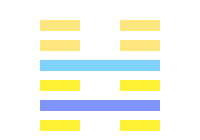
40.1.2.3 (40 > 55) - THE KIEH HEXAGRAM.
- 1. The first line, divided, shows that its subject will commit no error.
- 2. The second line, undivided, shows its subject catch, in hunting, three foxes, and obtain the yellow ( = golden) arrows. With firm correctness there will be good fortune.
- 3. The third line, divided, shows a porter with his burden, (yet) riding in a carriage. He will (only) tempt robbers to attack him. However firm and correct he may (try to) be, there will be cause for regret.
40.1.2.3 (40 > 55) - Building one's reputation
One plans a stunt without anyone else being informed.
Bing DeepL Google Yandex40.1.2.3 (40 > 55) - Building one's reputation
One plans a stunt without anyone else being informed.
Bing DeepL Google Yandex40.1.2.3 (40 > 55) - Kieh, la libération
Kieh : 1. Délivrer, faire échapper, échapper au danger ; 2. Disperser ; 3. Ouvrir, séparer, s’ouvrir. Se dit du mouvement de la germination. 4. Résoudre une difficulté, une complication.
-
1. Délivrer quelqu’un est chose excellente.
Quand le fort et le faible s’entendent selon la justice, il n’y a pas de faute à craindre. - 2. Délivrer est aussi heureux que, pour le chasseur, prendre trois renards et obtenir le prix, la flèche d’or. — Celui qui résout une difficulté, fait sortir d’une position difficile, est comme le chasseur qui prend trois renards et obtient la flèche d’or.
-
3. Si un porteur se met dans un char et qu’il survienne des voleurs, il sera attaqué et échappera difficilement ; s’il abandonne sa charge, il pourra se sauver.
Pour un porteur, aller en char est honteux ; c’est attirer sur soi les voleurs.
Il n’appartient pas à des gens du commun d’aller en char .
40.1.2.3 (40 > 55) - Construire sa renommée
On trame un coup d'éclat sans que les autres ne soient prévenus.
Bing DeepL Google Yandex40.1.2.3 (40 > 55) - Módosítás
- 1. Fel akarja szabadítani magát, ez egy jó döntés.
- 2. Megkérik hogy válaszokat keressen mielőtt túl késő.
- 3. Ha valaki elhanyagolja, másoknak adja.

